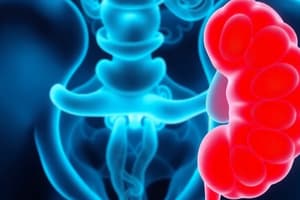Podcast
Questions and Answers
What is considered the greatest risk factor for urinary calculi?
What is considered the greatest risk factor for urinary calculi?
- Obesity
- Family or personal history of urinary calculi (correct)
- Dehydration
- Excess dietary intake of sodium
Which of the following medications can contribute to stone formation?
Which of the following medications can contribute to stone formation?
- Thiazide diuretics
- Probenecid (correct)
- Allopurinol
- Potassium citrate
Which dietary modification is recommended for calcium stones?
Which dietary modification is recommended for calcium stones?
- Limit calcium intake
- Increase animal protein intake
- Avoid high-oxalate foods (correct)
- Limit fluid intake
What is the recommended daily fluid intake to help prevent urinary calculi?
What is the recommended daily fluid intake to help prevent urinary calculi?
Which condition is associated with an increased risk for uric acid stones?
Which condition is associated with an increased risk for uric acid stones?
What is the primary management approach for struvite stones?
What is the primary management approach for struvite stones?
Which type of urinary calculi is most prevalent?
Which type of urinary calculi is most prevalent?
What type of dietary guidance is advised for uric acid stones?
What type of dietary guidance is advised for uric acid stones?
Flashcards are hidden until you start studying
Study Notes
Risk Factors
- Idiopathic: Most kidney stone cases have no identifiable cause.
- Family History: Family or personal history of kidney stones is the biggest risk factor.
- Dehydration: Decreases urine volume, allowing crystals to form.
- Obesity: Can increase risk of kidney stones due to metabolic changes.
- Diet: High intake of calcium, oxalate, or protein can contribute to stone formation.
- Medical Conditions: Gout, hyperparathyroidism, and urinary stasis increase the risk.
- Immobility: Loss of calcium from bones due to immobility can increase urine calcium levels.
- Hot climate: Increased sweating can lead to dehydration and stone formation.
- Medications: Some drugs like probenecid and chemotherapy agents can increase stone risk.
- Demographics: Males have a higher incidence of kidney stones compared to females. Non-Hispanic whites are more likely to develop stones than other racial groups. Lower socioeconomic populations are also at higher risk.
Prevention
- Fluid Intake: Most important intervention. Aim for 2.5 to 3 liters of fluids daily to dilute urine and prevent crystal formation.
- Dietary Modifications:
- Calcium Stones: Limit sodium and animal protein, maintain adequate calcium intake, and avoid high-oxalate foods like spinach and nuts.
- Uric Acid Stones: Limit animal protein intake.
- Medications:
- Thiazide diuretics: For calcium stones.
- Allopurinol: For uric acid stones.
- Antibiotics: For struvite stones.
Management
Patient Teaching
- Fluid Recommendations:
- Drink 2.5 to 3 liters daily unless contraindicated.
- Citrus juices like lemonade may help to prevent stone formation.
- Increase fluid intake in hot environments.
- Medication Adherence: Take prescribed medications to prevent stone formation.
- Dietary Guidance: Follow specific dietary recommendations based on stone composition.
- 24-Hour Urine Collection: Follow instructions to determine pH, calcium, uric acid, and oxalate levels.
Stone Type Management
- Calcium Phosphate/Oxalate:
- Most common type (75-80% of cases).
- Risk factors include hypercalciuria, dehydration, and certain medical conditions.
- Management: Thiazide diuretics, potassium citrate, limit sodium and animal protein, increase hydration.
- Struvite:
- 15-20% of cases.
- Caused by UTIs, particularly those involving Proteus bacteria.
- Management: Antibiotic therapy, surgical intervention or lithotripsy.
- Uric Acid:
- 5-10% of cases.
- Risk factors include gout and increased purine intake.
- Management: Potassium citrate, allopurinol, low-purine diet, increase hydration.
- Cystine:
- Rare.
- Caused by a genetic defect.
- Management: Mercaptopropionyl glycine, potassium citrate, sodium restriction, increase hydration.
Studying That Suits You
Use AI to generate personalized quizzes and flashcards to suit your learning preferences.




